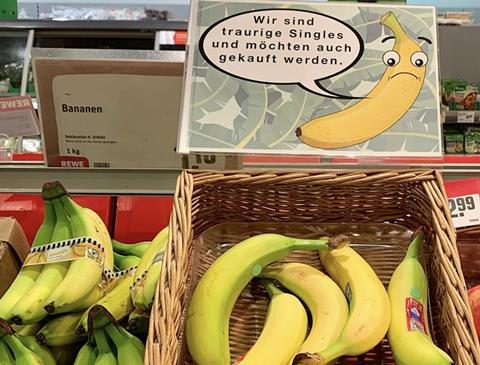A study from the UK’s University of Bath has shown how labelling lone bananas as ‘sad singles’ increases consumer empathy, boosting sales by 58 per cent

Perhaps it’s the impact of recent films like Sausage Party, an animated comedy that depicts the struggles of anthropomorphic food products, or it could be the absurdity of seeing a solitary banana being taped to a wall and sold for millions as art, but empathy for food might well be on the rise.
According to new research from the University of Bath’s School of Management, signs that encourage compassion for single loose bananas motivate consumers to make a purchase.
“A simple sign showing a banana with a downturned mouth, and the message ‘We are sad singles and want to be bought as well’, encouraged compassion in customers, who were moved by the idea of abandoned bananas longing for a home,” the study’s authors stated.
The research was published in the journal Psychology & Marketing and compared the effectiveness of ‘sad singles’ signage versus ‘happy singles’ for loose bananas, as well as tomatoes.
“Although both sentiments proved more effective than a sign that showed no emotion (‘Here are single bananas that want to be bought as well’) it was the signs conveying the sad emotions that proved the most effective,” the authors revealed. “On average, the number of single bananas sold per hour increased from 2.02 (when the emotionless banana sign was displayed) to 3.19 (with the sad banana sign) – an increase of 58 per cent.”
By contrast, the ‘happy banana’ signage increased hourly sales of single bananas by just 5.4 per cent.
“As far as we know, this is the first study comparing happy and sad expressions on bananas separated from their bunch to look at the impact on sales,” said Dr Lisa Eckmann from the Bath Retail Lab at the University of Bath. “The plight of the single bananas is really relatable and the findings have very practical applications for boosting sales and reducing food waste from our supermarkets.
“The need to belong is one of the most basic human motivations, and applying sadness to single, stray bananas evokes a compassionate response from shoppers. Labelling bananas with sad facial expressions sounds cute, but there’s very much a serious purpose. The study shows it’s an easy, low cost, effective intervention for retailers and policymakers.”
The researchers, from the University of Bath, RWTH Aachen University and Goethe University Frankfurt, conducted the experiment at German retailer Rewe, observing the purchasing behaviour of single bananas of 3,810 customers over 192 hours.
Although compassionate signage failed to outweigh the sales impact of a price discount, the researchers said such efforts could be used as a plan A.
“Food retailers could apply a step-wise intervention approach where they first use anthropomorphism as a sales-boosting strategy before turning to price discounts,” said Dr Eckmann advised. “We don’t know whether consumers might get emotionally numb to sad bananas in the long term, but it’s an idea that certainly draws people in, and is easy to act on.”
The researchers suggested future research could look at how sad expressions might help drive sales when produce is deformed or slightly damaged.



